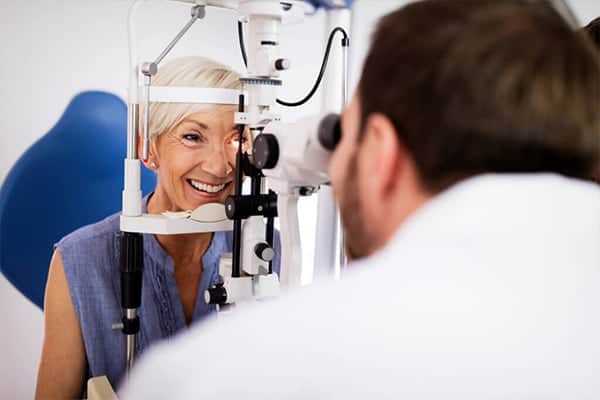Preoperative assessment for refractive surgery
Discover our other pages dedicated to the cornea
The cornea
Laser surgery
Implants
Prelex
Useful information on the preoperative assessment for refractive surgery
- Determine whether the patient is eligible for surgery
- Identify which technique is most suitable
Whenever possible, subtractive techniques are preferred. Regardless of the chosen method, the results must be excellent and reproducible.
The very high satisfaction rate is largely based on the thoroughness of the preoperative examination, the search for contraindications such as keratoconus, the selection of the technique best suited to the patient, and a clear explanation of the objectives of the procedure.
The preoperative assessment is conducted in several stages to gather all the necessary information for optimal surgical results. This also ensures that you receive comprehensive and tailored information for a well-informed decision.
First preoperative appointment
- We collect your ophthalmological and general medical history, lifestyle habits (occupation, sports, contact lens use and tolerance, pregnancy plans, ongoing treatments, etc.), and the reasons prompting you to consider refractive surgery (comfort, professional requirements, sports, etc.).
- We assess your vision.
- We perform a medical ophthalmological examination, including analysis of the tear film and screening for ophthalmological conditions that could contraindicate refractive surgery.
- We explain the main principles of refractive surgery and the technique(s) that appear most suitable based on the preliminary findings from this first appointment.
Second preoperative appointment
- We carry out a comprehensive examination of the ocular structures relevant to the surgery with our orthoptists: the cornea for laser procedures; the cornea, anterior chamber, and crystalline lens for phakic lens implants and clear lens extraction.
- Corneal Topography: This examination collects data on the curvature and elevation of the cornea. It is a medico-legal requirement before any refractive surgery. The aim is a detailed analysis of the cornea, measuring anterior and posterior elevation, as well as obtaining keratometry and pachymetry maps. The most common corneal topographers are the Pentacam and Orbscan. Corneal topography detects subclinical keratoconus and risk factors for postoperative corneal decompensation. It also guides the choice of surgical technique (LASIK, PRK, etc.). To help diagnose corneas at risk for refractive surgery, risk scoring systems have been developed. The Score Analyser software, based on Orbscan data, provides a numerical result. This score guides the choice of technique (no LASIK if the score is above 0), but it is only valid for myopic patients.
- Aberrometry: This test evaluates the optical aberrations of the eye. It collects the wavefront, which is analyzed to identify low-order aberrations (astigmatism, etc.) correctable with glasses, and high-order aberrations (coma, trefoil, tetrafoil, etc.) that are not correctable with glasses. Combining aberrometry with the excimer laser allows for customized treatments that address both basic optical defects (myopia, astigmatism, or hyperopia) and high-order aberrations, leading to better postoperative visual quality.
- Biometry: If a PRELEX (Presbyopic Lens Exchange) is considered, ocular biometry (IOL Master) is performed to calculate the power of the intraocular lens. Biometry is also performed if a phakic lens implant is planned.
Third preoperative appointment
- We explain the results of the entire assessment.
- We determine whether refractive surgery is feasible (absence of contraindications) and which technique is most appropriate. We discuss the benefits and risks of the selected technique according to your refractive error, expectations, profession, and lifestyle.
- We inform you about the details of the procedure, including intraoperative and postoperative course and recovery.
- Together, we schedule the surgery and provide you with the operative file and patient information sheets from the French Society of Ophthalmology.
Book an appointment with Dr. Rambaud
Have a question? Ask Dr. Rambaud
This page was written by Dr. Camille Rambaud, an ophthalmologist based in Paris and a specialist in refractive surgery.



0 Comments